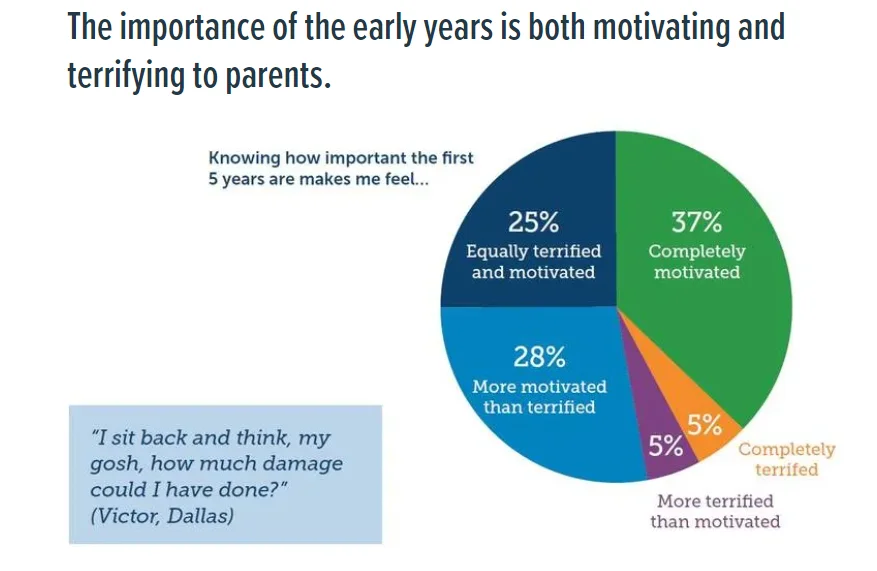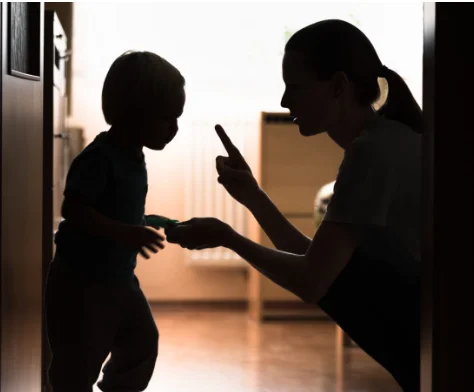

“As a young child, Sarah was afraid of the dark. Her parents, believing that a little fear could be a good teacher, would sometimes leave her in a dimly lit room as a punishment for her bad behavior. This only heightened Sarah’s fear of the dark and left her feeling anxious and alone. As an adult, Sarah struggled with a deep-seated fear of the unknown and had difficulty trusting others and seeking out new experiences. She realized that her parents’ fear-based parenting had had a lasting impact on her and made a conscious effort to overcome her fears and live a more courageous and fulfilling life.”
Update: This article was last updated on 16th January 2026 to reflect the accuracy and up-to-date information on the page.
This is the story of the negative impact fear-based parenting has on children. The discipline based on fear can exacerbate the child’s natural fears and lead him to become anxious, lonely, and unable to trust anyone. This implies that fear-based parenting has an effect even when the person is grown and that it might hinder the person from coping with or overcoming their fears.
The story ultimately suggests that love and understanding are more effective and healthier approaches to parenting than relying on fear-based compliance methods.
| S.No. | Table of Contents |
|---|---|
| 1. | What is fear-based parenting? |
| 2. | Why do some parents use fear-based parenting? |
| 3. | Why is fear-based parenting bad? |
| 4. | Are there any pros of fear-based parenting? |
| 5. | What is the solution? |
| 6. | Conclusion |

What is fear-based parenting?

Recommended reading:
Parenting Through Transitions: Supporting Kids During Life Changes
Fear-based parenting is the parenting that uses fear to control a child’s behavior and instill good habits. It involves punishing children for bad behavior, high expectations of their performance, and threats or intimidation to ensure obedience.
The American Association of Marriage and Family Therapy report cites family therapist Lisa Pisha as saying that children are naturally fearful at times, and this fear is amplified when a parent fears too. This parenting out of fear further heightens a child’s innate fears. Impacts on children range from increased time indoors, isolation, avoidance behaviors, and depression, among others.
Why do some parents use fear-based parenting?
Some parents use fear-based parenting techniques for any number of reasons.
✔️Parents who use fear-based parenting may actually believe they are ensuring that their children do not get themselves into trouble with these strict and intimidatory tactics.
✔️Perhaps they were disciplined by their parents with fear when they were young, and that is the method they have learned to be useful in their parenting.
✔️Other parents may use fear in their children. Some parents may also resort to fear as a means of trying to control or protect their children, believing that by instilling fear into their children, they can save them from harm or danger and make them refrain from risking behaviors that could put them in potentially dangerous situations.
✔️Other parents may use fear-based parenting out of a lack of knowledge or understanding of alternative discipline techniques or as a way of exerting power and control over their children.
Recommended reading: Best Co-Parenting Quotes
Why is fear-based parenting bad?

Recommended reading:
Parenting Through the Teen Years: Nurturing Independence and Responsibility
The effects of fear-based parenting are indeed very detrimental to children. Some potential negative effects of fear-based parenting include the following:
☑️Anxiety: Children raised with fear-based discipline will end up becoming anxious and fearful of mistakes or the consequences that they will face. It can result in chronic anxiety and poor decision-making and problem-solving skills.
☑️Damages self-esteem: Fear-based parenting makes children believe that they are incapable or unworthy of love and acceptance. This hurts their self-esteem and self-confidence.
☑️Impairment of trust and relationships: Children raised in a fear-based environment will have problems trusting others and forming healthy relationships. This has long-term effects on their social and emotional development.
☑️Behavioral problems: Children who are raised by fear-based parenting become rebellious or take risks in order to deal with or fight fear.
☑️Physical health problems: The stress and anxiety associated with fear-based parenting negatively affect children’s physical health, including impairing the immune system and increasing the risk of certain health conditions.
Recommended reading: 10 Ways How To Raise a Problem-Solver Kid and Teach Problem-Solving Skills
Are there any pros of fear-based parenting?
While there can be some short-term advantages to fearing being punished, for example, a child quickly stopping an undesirable behavior in order not to get punished, there are no long-term advantages of fear-based parenting.
What is the Solution?
Transitioning from Fear-Based to Love and Respect-Based Parenting
There are a few alternatives to fear-based parenting:
🔔Positive reinforcement: Instead of using fear to control your child’s behavior, try using positive reinforcement. This means praising and rewarding your child for good behavior and effort.
🔔Set clear expectations and consequences: Help your child understand what is expected of them by setting clear rules and consequences for both good and bad behavior.
🔔Teaching problem-solving and decision-making skills: Avoid relying on fear to control your child’s behavior; instead teach them how to make good decisions and solve problems on their own.
🔔Using reasoning and communication: When your child misbehaves, try using reasoning and communication to help them understand the consequences of their actions and how to make better choices in the future.
🔔Provide a loving and supportive environment: Create an environment that will make your child feel safe and valued. He or she will be more confident and secure to face the world and its problems.
Recommended reading: How to Encourage Your Child’s Independence and Confidence
Myths vs. Facts
Myth No. 1: “Fear-based parenting is an effective way to discipline and control children.”
Fact: Fear-based parenting may yield short-term compliance but invariably has long-term negative implications for a child’s emotional well-being, self-esteem, and overall growth.
Myth No. 2 : “Children must be afraid of their parents so that they may respect them.”
Fact: Respect can be achieved by promoting open communication, trust, and positive behavioral models in parents. Parenting out of fear can destroy trust and hinder the progression toward a healthy parent-child relationship.
Myth No. 3: “Fear-based parenting is the only way to keep children safe and good.”
Fact: Alternative forms of parenting with the emphasis of educating the child in the acquisition of critical thinking, empathy, and decision-making capabilities are more independent and responsible behavior.
Myth No. 4: “Children reared without fear-based parenting are unruly and disobedient.
Fact: Positive parenting techniques would lead to children who are balanced, confident, and more responsible in their choices and respectful to others.
Myth No. 5: “Fear-based parenting is cultural; it should not be challenged.”
Fact: The culture changes over time. It is thus important to assess parenting methods as they are done to ensure they are for the child’s better emotional and psychological development.
Conclusion: Fear-based parenting doesn’t prepare children for the real world
In the real world, children will encounter challenges and need to learn how to cope with them and overcome fears to become successful and happy. Give your child space to make their own decisions and solve their problems independently.
In this blog, we cover some important topics, including the question: should a child fear their parents, and the potential impact of fear-based parenting on a child’s development.
This will help them develop critical thinking and problem-solving skills. Help your child understand the importance of being responsible and reliable by giving them age-appropriate tasks and responsibilities.
Looking for a comprehensive parenting guide to ensure you are on the right track? Explore a wealth of parenting wisdom and educational insights in Moonpreneur’s blogs. Additionally, you can join our programs that nurture the next generation of innovators. Book a free trial now!


























I am observing that my son is scared of small things, do kids learn fear from their parents?
It is proved that anxiety can be passed down in families. One reason for this is that kids can easily pick up on fear from their parents.
How does an angry mother affect a child?
Children of angry parents are more likely to experience social and emotional challenges as well as a higher chance of developing mental health issues in the future. Take a few deep breaths, leave the room, put on some soothing music, or take a stroll to help you relax if you see yourself getting irritated
But what about setting boundaries? Isn’t that fear-based?
Absolutely necessary boundaries can be set without fear. Focus on safety and respect, explaining why certain behaviors are off-limits.